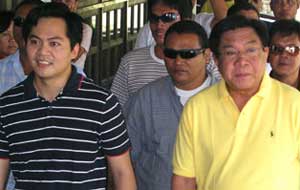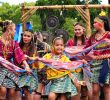
‘A Nograles By Chance.’ Karlo Nograles (left) says it’s unfair to use against him the fact that he’s a Nograles. In this photo taken last month, Karlo accompanied his father (right) to the Comelec. (davaotoday.com file photo by Barry Ohaylan)
Karlo Nograles, the son of Davao City congressman and staunch Arroyo ally Prospero Nograles, is eyeing a seat in Congress through an OFW partylist group. He maintains that it�s merely by chance that he is the son of Prospero and that he does have a soft spot for OFWs even though he�s not one of them. Some people, however, see his running as just part of the alleged plot to field partylist groups said to have links with Malacanang.
By Germelina A. Lacorte
davaotoday.com
DAVAO CITY — He just happened to be the son of his father, the House Majority Floorleader Prospero Nograles. But Karlo Nograles, who is eyeing a seat in Congress as the second nominee of Kalahi, a partylist group for overseas Filipino workers (OFW), said it is unfair to exclude him from the partylist group just by reason of his birth.
In the first place, it was Kalahi itself that invited him to join them, not the other way around, he told davaotoday.com.
�It�s only by chance that I�m the son of Congressman Nograles,� he said, �But that does not mean I cannot create and enact laws that will defend the marginalized sector that my partylist represents.�
Kalahi, however, was among the partylist groups that Migrante, the group advocating for OFW rights, had earlier accused of being set up by the Arroyo administration to increase the number of pro-administration members at the House of Representatives, an accusation Nograles denied.
Nograles admitted eyeing the post of vice mayor of Davao City earlier but decided to back out when Mayor Rodrigo Duterte picked his daughter Sara for his running mate. Duterte�s political group Hugpong has a tactical alliance with the administration Team Unity ticket, where the Nograleses belong.
Rey Magno Teves, Kusog Mindanao convenor and leading proponent of Federal Mindanaw, said that the partylist system has opened a more convenient avenue for traditional politicians to seek power. �It started as a brilliant idea to accommodate in Congress representatives of some sectors in the society who are marginalized,� Teves said.
�But now, it has been abused and it has been open to serve a totally different end,� Teves said. He said that partylist groups have also become a convenient vehicle for children of traditional political clans to easily win a seat in Congress, a backdoor entry that, critics say, bastardizes the whole concept of the partylist system.
�That simply is not true,� Nograles countered. �In fact, it is much more difficult to run under the partylist. If I run under a political party, I only have to win 180,000 votes to be a Congressman for the first district. That is much, much easier,� he said.
As the second nominee of Kalahi, he said his group had to garner over 700,000 votes to win a seat in Congress. Under Republic Act No. 7941 or the Partylist System Act of 1995, party-list groups have to win at least two percent of all votes cast for the partylist system to be granted a seat in Congress. Partylist groups are allowed only up to three seats.
Some sectors also questioned him for running under the partylist group that is supposed to represent the interest of the overseas contract worker sector when he is not a migrant worker in the first place. Nograles said he did not present himself to the group but it was Kalahi that invited him to be one of their nominees. Besides, he said that, as a lawyer, he has defended Filipino migrant workers against abuse by their employers abroad. (Germelina Lacorte/davaotoday.com)
2007 Elections, Pinoy Life Abroad









